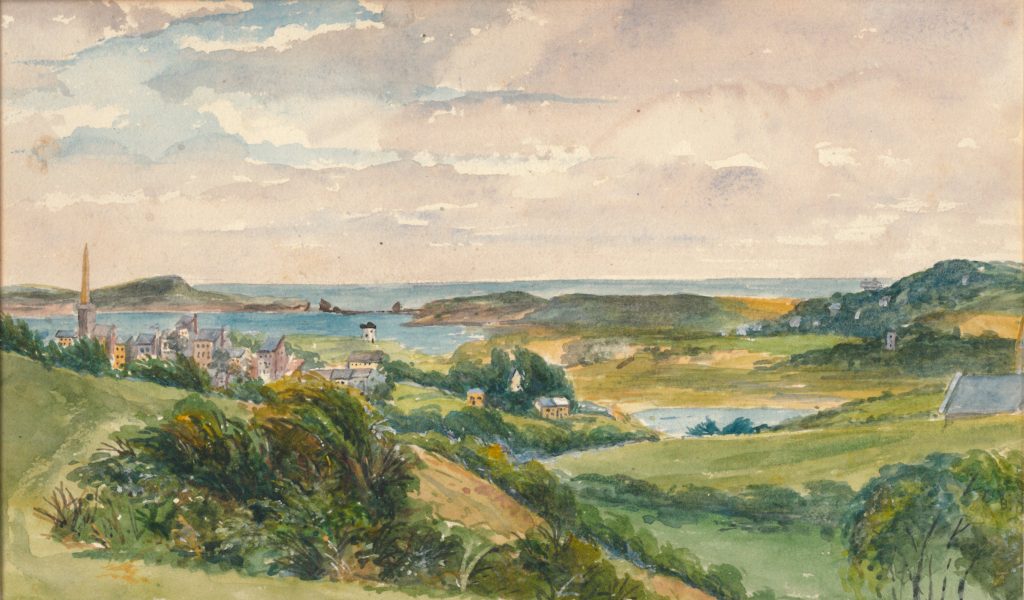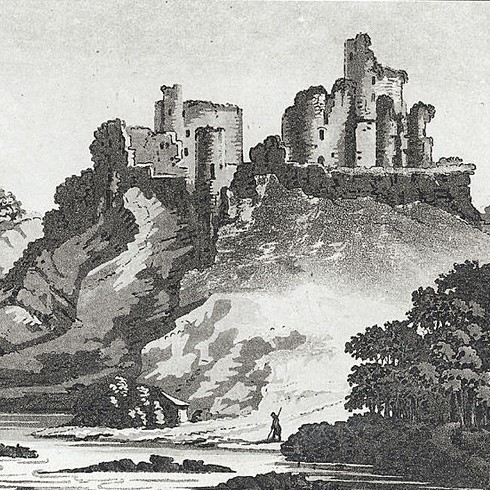Frances Price Gwynne
Fanny Price Gwynne was born in Tenby in 1819. Throughout her life she was fascinated by the history of the town and spent time observing local castles and churches as well as the natural landscapes and their flora and fauna.
Fanny was an accomplished artist and writer who also dedicated much of her time to causes she was passionate about. She married a solicitor, John Gwynne, in 1845 and co-founded the Shipwrecked Mariner’s Society and later, Tenby branch of the Lifeboat Institution. In 1876 she supported the building of St. Julian’s Fisherman Chapel and was involved in the campaign for a museum in Tenby; donating artefacts to the collection and attending the opening in July 1878. She was also a leading member of Tenby’s Victorian Society and protested against the proposed demolition of the South West Gateway (Five Arches).
In her lifetime, some of Fanny’s etchings were published and sold in Tenby and as well as their artistic merit, they offer an invaluable insight into mid-Victorian Pembrokeshire. Similarly, her paintings include Albert, Prince of Wales, on Castle Hill (1865), which reveals the bustle and excitement of a royal visit; and Lydstep Caverns, which depicts the nineteenth century fascination with natural history. Many of her paintings are held at Tenby Museum and Art Gallery.
Fanny’s first book Sketches of Tenby and its Neighbourhood (1846) was quickly followed by Allen’s Guide to Tenby, described as ‘a carefully observed guidebook with facts never previously recorded’. The Tenby Souvenir explored tales of seafarers, local history and scenery through poetry and prose. Fanny also produced an illustrated novella (Ton at the Seaside) about a Victorian summer in Tenby and Five Pounds Reward, a farce for the dramatic society. She also composed music and poetry that appeared in The Red Dragon, the National Magazine of Wales.
Fanny played an important role in the social life of Tenby. She was actively involved in charitable activities and in 1870 it is noted that she ‘would be happy to present the hospital [the proposed Cottage Hospital] with a kitchen range’. She later joined the general committee of the cottage hospital. She and her husband John also made generous donations to the building fund for the Tenby parochial schools despite having no children of their own.
In her later years, Fanny suffered illness and neglect. John died in 1880 and Fanny remained at their home in Bridge Street with a maid, Martha Parcell. However, by 1898 her condition was described as ‘in want of the meanest things in life, namely food, fire and clothing’. The Medical Officer of Health said ‘the house was filthy and filled with an abominable stench which was injurious to health…the very old lady, seated in an armchair in front of a gas stove from which very little warmth was obtainable, was afraid to complain in case her servant, who was usually drunk at night, tried to poison her’. Ultimately, a doctor was appointed to ensure her wellbeing and friends assisted with food and clothing.
Frances Price Gwynne died in 1901, aged 82 years. Her prolific contribution to the arts, literature and heritage of Tenby and West Wales is testament to her life which is also commemorated on her home in Bridge Street.
Ganed Fanny Price Gwyther yn Ninbych-y-pysgod yn 1819. Trwy gydol ei hoes, fe’i hudwyd gan hanes y dref a threuliodd amser yn arsylwi ar gestyll ac eglwysi lleol ynghyd â’r tirweddau naturiol a’u blodau a’u ffawna.
Roedd Fanny yn artist ac yn awdur dawnus a chysegrodd lawer o’i hamser i achosion a oedd yn agos iawn at ei chalon. Priododd â chyfreithiwr, John Gwynne, yn 1845 a chyd-sylfaenodd y gymdeithas o’r enw ‘Shipwrecked Mariner’s Society’ ac, yn ddiweddarach, cangen Sefydliad y Bad Achub Dinbych-y-pysgod. Yn 1876 cefnogodd y gwaith o adeiladu Capel y Pysgotwyr St Julian ac roedd yn rhan o’r ymgyrch i sicrhau amgueddfa yn Ninbych-y-pysgod; rhoddodd arteffactau i’r casgliad a daeth i’r agoriad ym mis Gorffennaf 1878. Roedd hefyd yn aelod arweiniol o Gymdeithas Fictoraidd Dinbych-y-pysgod a phrotestiodd yn erbyn y cynnig i ddymchwel Porth y De-orllewin (Y Pum Bwa).
Yn ystod ei hoes, cyhoeddwyd rhai o ysgythriadau Fanny ac fe’u gwerthwyd yn Ninbych-y-pysgod. Yn ogystal â’u rhinweddau artistig, maent hefyd yn cynnig cipolwg amhrisiadwy ar Sir Benfro yng nghanol Oes Fictoria. Yn yr un modd, mae ei phaentiadau’n cynnwys Albert, Prince of Wales, on Castle Hill (1865), sy’n datgelu holl fwrlwm a chyffro ymweliad brenhinol; a Lydstep Caverns, sy’n darlunio’r diddordeb mewn hanes naturiol yn y bedwaredd ganrif ar bymtheg. Mae llawero’i phaentiadau yn Amgueddfa ac Oriel Gelf Dinbych-y-pysgod.
Yn dilyn llyfr cyntaf Fanny, Sketches of Tenby and its Neighbourhood (1846) buan y cyhoeddwyd Allen’s Guide to Tenby, a ddisgrifiwyd fel ‘tywyslyfr ag ynddo arsylwadau gofalus gyda ffeithiau na chofnodwyd cyn hyn’. Roedd The Tenby Souvenir yn archwilio hanesion morwyr, hanes lleol a golygfeydd trwy farddoniaeth a rhyddiaith. Lluniodd Fanny nofela â darluniau hefyd (Ton at the Seaside) am haf Fictoraidd yn Ninbych-y-pysgod a Five Pounds Reward, ffars ar gyfer y gymdeithas ddrama. Cyfansoddodd gerddoriaeth a cherddi hefyd, a gyhoeddwyd yn Red Dragon, Cylchgrawn Cenedlaethol Cymru.
Chwaraeodd Fanny ran bwysig ym mywyd cymdeithasol Dinbych-y-pysgod. Chwaraeai ran weithgar mewn gweithgareddau elusennol ac yn 1870 nodwyd y byddai’n ‘hapus i gyflwyno i’r ysbyty [yr Ysbyty Bach arfaethedig] ffwrn ar gyfer y gegin’. Yn ddiweddarach, ymunodd â phwyllgor cyffredinol yr ysbyty bach. Roedd hi a’i gŵr John hefyd yn hael eu rhoddion i’r gronfa adeiladu ar gyfer ysgolion y plwyf yn Ninbych-y-pysgod er nad oedd ganddynt blant eu hunain.
Yn ei blynyddoedd hwyrach, dioddefodd Fanny salwch ac esgeulustod. Bu farw John yn 1880 ac arhosodd Fanny yn eu cartref yn Stryd y Bont gyda morwyn, Martha Parcell. Serch hynny, erbyn 1898 disgrifiwyd ei chyflwr fel ‘ag eisiau’r pethau mwyaf sylfaenol mewn bywyd, sef bwyd, tân a dillad’. Dywedodd y Swyddog Meddygol Iechyd ‘the house was filthy and filled with an abominable stench which was injurious to health…the very old lady, seated in an armchair in front of a gas stove from which very little warmth was obtainable, was afraid to complain in case her servant, who was usually drunk at night, tried to poison her’. Yn y pendraw, penodwyd meddyg i sicrhau ei llesiant a chynorthwyodd ffrindiau gyda’r bwyd a’r dillad.

Mark Lewis, Deeds not Words: A Celebration of Women and Tenby, 2018.





